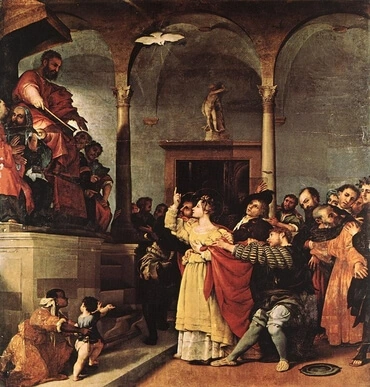1
And the word of the Lord came to me, saying:
2
Son of man, set thy face against Gog, the land of Magog, the chief prince of Mosoch and Thubal: and prophesy of him,
3
And say to him: Thus saith the Lord God: Behold, I come against thee, O Gog, the chief prince of Mosoch and Thubal.
4
And I will turn thee about, and I will put a bit in thy jaws: and I will bring thee forth, and ail thy army, horses and horsemen all clothed with coats of mail, a great multitude, armed with spears and shields and swords.
5
The Persians, Ethiopians, and Libyans with them, all with shields and helmets.
6
Gomer, and all his bands, the house of Thogorma, the northern parts and all his strength, and many peoples with thee.
7
Prepare and make thyself ready, and all thy multitude that is assembled about thee, and be thou commander over them.
8
After many days thou shalt be visited: at the end of years thou shalt come to the land that is returned from the sword, and is gathered out of many nations, to the mountains of Israel which have been continually waste: but it hath been brought forth out of the nations, and they shall all of them dwell securely in
9
And thou shalt go up and come like a storm, and like a cloud to cover the land, thou and all thy bands and many people with thee.
10
Thus saith the Lord God: In that day projects shall enter into thy heart, and thou shalt conceive a mischievous design.
11
And thou shalt say: I will go up to the land which is without a wall, I will come to them that are at rest, and dwell securely: all these dwell without a wall, they have no bars nor gates :
12
To take spoils, and lay hold on the prey, to lay thy hand upon them that had been wasted, and afterwards restored, and upon the people that is gathered together out of the nations, which hath begun to possess and to dwell in the midst of the earth.
13
Saba, and Dedan, and the merchants of Tharsis, and all the lions thereof shall say to thee: Art thou come to take spoils? behold, thou hast gathered thy multitude to take a prey, to take silver, and gold, and to carry away goods and substance, and to take rich spoils.
14
Therefore, thou son of man, prophesy and say to Cog: Thus saith the Lord God: Shalt thou not know, in that day, when my people of Israel shall dwell securely?
15
And then shalt come out of thy place from the northern parts, thou and many people with thee, all of them riding upon horses, a great company and a mighty army.
16
And thou shalt come upon my people of Israel like a cloud, to cover the earth. Thou shalt be in the latter days, and I will bring thee upon my land: that the nations may know me, when I shall be sanctified in thee, O Gog, before their eyes.
17
Thus saith the Lord God: Thou then art he, of whom I have spoken in the days of old, by my servants the prophets of Israel, who prophesied in the days of those times that I would bring thee upon them.
18
And it shall come to pass in that day, in the day of the coming of Gog upon the land of Israel, saith the Lord God, that my indignation shall come up in my wrath.
19
And I have spoken in my zeal, and in the fire of my anger, that in that day there shall be a great commotion upon the land of Israel:
20
So that the fishes of the sea, and the birds of the air, and the beasts of the field, and every creeping thing that creepeth upon the ground, and all men that are upon the face of the earth, shall be moved at my presence: and the mountains shall be thrown down, and the hedges shall fall, and every wall shall fall to the ground.
21
And I will call in the sword against him in all my mountains, saith the Lord God: every man's sword shall be pointed against his brother.
22
And I will judge him with pestilence, and with blood, and with violent rain, and vast hailstones: I will rain fire and brimstone upon him, and upon his army, and upon the many nations that are with him.
23
And I will be magnified, and I will be sanctified: and I will be known in the eyes of many nations: and they shall know that I am the Lord.







